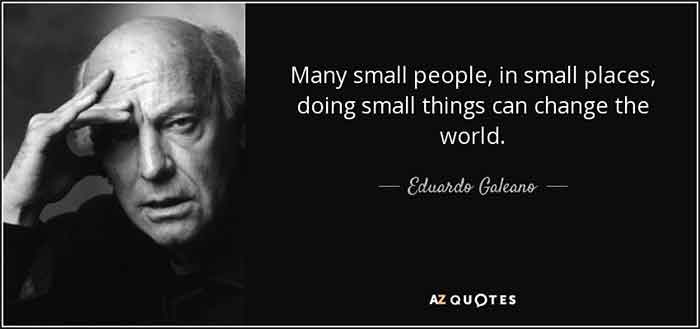
In narrow terms of the development of technology and the means of material comfort and luxury, recent decades have witnessed the pinnacle of human achievement. This is often taken to be the most obvious indicator of the progress of humanity and on this basis it is often believed that humanity has progressed a lot. Although this is a widely held belief, on more serious introspection this concept of human progress is found to be increasingly surrounded by too many troubling questions.
In recent decades there have been several instances of decisions by the most powerful and developed, richest countries due to which tens of thousands and sometimes even millions of people died in very painful ways, and in addition even more people suffered serious injuries, disabilities, displacement and other forms of extreme distress. All of these were entirely avoidable. Any inquiry of the background of people who took the decisions to cause such destruction (and persisted with these decisions over long periods despite attention being drawn to their destructivity), generally reveals that these persons were mostly educated in some of those institutions which are supposed to be the most advanced. The most advanced education in these centers of ‘progress’ equipped and prepared not for creating a better and more kind world, but for causing endless death and misery.
This is certainly true of the massive bombing of Vietnam, Cambodia and Laos by the USA which was entirely devoid of any plausible reason and of any rationality. In the pages of history this remains a major example of insane destruction. Yet it was the work of policy makers who had received the most ‘advanced’ education. The architects of this destruction continued all their life to live a very privileged life and get respect at very high levels of society. In fact one of them received the Nobel Peace Prize!
Similarly almost all those who have taken many decisions regarding the destruction of one country after another in never-ending wars and proxy wars and in the killing of millions of persons directly and indirectly in these wars, who have taken decisions regarding the toppling of democratic, welfare-oriented governments (pushing these countries for years into the lap of highly oppressive dictatorships) or assassination of popular leaders dedicated to peace and justice continue to enjoy a privileged life at high levels of society.
The fact that those from very prestigious institutes take such decisions (not as an isolated mistake but with consistency over prolonged periods) and the fact that a wide consensus on such terrible decisions is somehow manufactured, with cooperation of many other scholars from the same prestigious places of learning, is deeply disturbing. This indicates that at the pinnacle of progress something is very seriously wrong among those who are supposed to represent the ‘progress’ of humanity at its highest levels.
Similarly some of the most ‘advanced’ corporate institutions in the form of huge multinational companies with almost a worldwide reach have been associated with the relentless pursuit of not just very high profits but also of such control over entire sectors of great importance (such as food and agriculture or health and medicines) that the issues of human welfare or fulfilling real needs of people are very seriously violated in significant ways. Worst of all and most dangerous are the big corporations engaged in the manufacture and sale of weapons, going much beyond their role of making and selling highly destructive weapons to become actual instigators or promoters of never-ending wars.
There have been several instances when humanity which prided itself in the highest development of technology came in contact with indigenous, isolated communities which had lagged much behind in such material achievements. Such contacts frequently led to incredibly cruel and aggressive actions on the part of the more ‘developed’ and ‘progressed’ part of humanity to grab the land and resources of the weaker people. These cruel actions sometimes took the form of genocides leading to the death of a big majority of the people who were targeted. However more thoughtful efforts to understand in a better way the vanquished people revealed many of them to be capable of living with much more kindness among themselves, with others and with nature.
On the other hand the extension of the attitudes of conquest and dominance towards nature in the course of ‘progress’ by the more dominant part of humanity has led to the ravaging of biodiversity and environment to such an extent that now the basic life-nurturing conditions of the planet are threatened. However even after this realization, massive ecological destruction has continued on a massive scale.
All this raises very troubling questions about the ‘progress’ humanity is supposed to have achieved and where this is taking us. As the very survival of life is endangered on such a path, the entire concept of progress needs to be seriously, very thoughtfully reconsidered and re-imagined. Imagine a forest community several thousand years back which was able to live with kindness towards each other, towards other such neighbor communities, towards other forms of life and took care not to harm trees and water sources. Such a community was in a higher stage of progress compared to several highly ‘developed’ present-day settlements of very rich people who have access to great luxuries but who are prepared to be very hostile towards others and towards nature in order to ensure access to their luxuries.
So the most important indicator of real progress is not advance of technology or the accumulation of material goods and services of comfort and luxury. Instead it is the commitment of any society to justice, equality, peace and protection of environment and biodiversity. It is when society is based on such commitment that real progress is achieved. Future hope for humanity rests in the thousands of small efforts which have been made and are being made in keeping with this commitment. The challenge is to make such efforts bigger and more durable and to persist with such efforts, involving more and more people and their campaigns and movements, till such efforts become the mainstream human endeavor, the main identity of humanity.
Bharat Dogra is Honorary Convener, Campaign to Save Earth Now. His recent books include Planet in Peril, Protecting Earth for Children and A Day in 2071.
















































